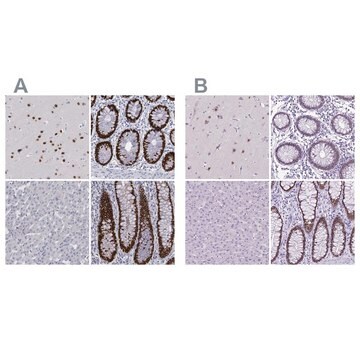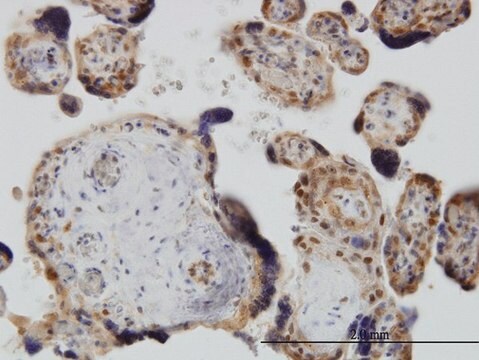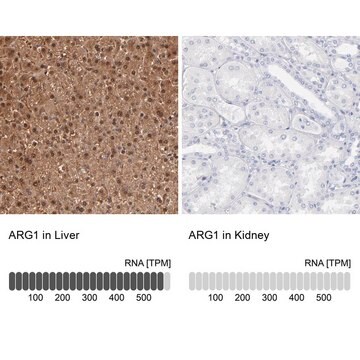推荐产品
生物源
mouse
品質等級
100
500
共軛
unconjugated
抗體表格
culture supernatant
抗體產品種類
primary antibodies
無性繁殖
MRQ-31, monoclonal
描述
For In Vitro Diagnostic Use in Select Regions (See Chart)
形狀
buffered aqueous solution
物種活性
human
包裝
vial of 0.1 mL concentrate (310M-24)
vial of 0.5 mL concentrate (310M-25)
bottle of 1.0 mL predilute (310M-27)
vial of 1.0 mL concentrate (310M-26)
bottle of 7.0 mL predilute (310M-28)
製造商/商標名
Cell Marque™
技術
immunohistochemistry (formalin-fixed, paraffin-embedded sections): 1:100-1:500
同型
IgG2a
控制
parathyroid tissue
運輸包裝
wet ice
儲存溫度
2-8°C
視覺化
cytoplasmic
基因資訊
human ... PTH(5741)
一般說明
The rate of parathormone secretion is directly responsive to the level of calcium in the serum, and indeed the cytoplasm, of parathyroid cells, as has been shown by studies both in vivo and in vitro (Brown et al, 1982). Recent in vitro studies of osteoclast turnover suggest that both PTH and PTH-related protein exert both pro- and anti-apoptotic effects in mesenchymal cells (Chen et al, 2002)
Surgical pathologists are familiar with the ability of parathyroid proliferations to assume a variety of histological guises, posing difficulty to categorize any given lesion as hyperplastic, adenomatous or carcinomatous in nature (Wick et al, 1997). This is usually resolved with macroscopic appearance of the remaining parathyroid glands as assessed by the surgeon. The role of the surgical pathologist is to identify the lesion as parathyroid in nature and to assess whether it is normocellular or hypercellular. Although easily accomplished in the majority of instances, rare examples of parathyroid hyperplasia/adenoma showing a follicular/trabecular arrangement may cause concern over the alternative diagnosis of a thyroid adenoma. This becomes more pertinent when the parathyroid lesion abuts into the thyroid gland or lies within the thyroid capsule. Immunostaining for thyroglobulin and parathyroid hormone (PTH) is especially useful to resolve the problem (Permanetter et al, 1983). Nevertheless, caution should be exercised since parathyroid cells often discharge their hormonal product almost as soon as it is packaged in the cytoplasm, resulting in false-negative anti-PTH immunostaining, although the cells are biologically synthetic (Wick et al, 1997)
Anti-PTH antibody is also useful to distinguish parathyroid hyperplasia/neoplasms from thyroid and metastatic neoplasms (Wick et al, 1997); although the pathologist is typically aware of the preoperative hypercalcemic status. Occasionally when the surgeon does not supply this information PTH immunohistochemistry is essential. Even more problematic, are situations in which clear cell parathyroid carcinomas are nonsecretory without an abnormality in mineral metabolism (Aldinger et al, 1982). In such situations, metastatic renal cell carcinoma or metastatic clear cell carcinoma of the lung is evident warranting PTH immunohistochemistry to arrive at the correct diagnosis (Wick et al, 1997). The other instance in which anti-PTH antibodies are useful is in the consideration of parathyroid carcinomas located primarily in the anterior mediastinum (intrathymically). In this situation distinction from primary thymic metastatic carcinomas, non-Hodgkin′s lymphoma and germ cell tumors is necessary (Murphy et al, 1986).
The diagnosis of the majority of parathyroid proliferation may be accomplished with an adequate history, biochemistry profile, and histomorphological assessment; however, rare instances in which the tumors have an abnormal location, clear cell morphology, or a non-secretory may result in erroneous diagnoses, warranting anti-PTH immunohistochemistry.
Surgical pathologists are familiar with the ability of parathyroid proliferations to assume a variety of histological guises, posing difficulty to categorize any given lesion as hyperplastic, adenomatous or carcinomatous in nature (Wick et al, 1997). This is usually resolved with macroscopic appearance of the remaining parathyroid glands as assessed by the surgeon. The role of the surgical pathologist is to identify the lesion as parathyroid in nature and to assess whether it is normocellular or hypercellular. Although easily accomplished in the majority of instances, rare examples of parathyroid hyperplasia/adenoma showing a follicular/trabecular arrangement may cause concern over the alternative diagnosis of a thyroid adenoma. This becomes more pertinent when the parathyroid lesion abuts into the thyroid gland or lies within the thyroid capsule. Immunostaining for thyroglobulin and parathyroid hormone (PTH) is especially useful to resolve the problem (Permanetter et al, 1983). Nevertheless, caution should be exercised since parathyroid cells often discharge their hormonal product almost as soon as it is packaged in the cytoplasm, resulting in false-negative anti-PTH immunostaining, although the cells are biologically synthetic (Wick et al, 1997)
Anti-PTH antibody is also useful to distinguish parathyroid hyperplasia/neoplasms from thyroid and metastatic neoplasms (Wick et al, 1997); although the pathologist is typically aware of the preoperative hypercalcemic status. Occasionally when the surgeon does not supply this information PTH immunohistochemistry is essential. Even more problematic, are situations in which clear cell parathyroid carcinomas are nonsecretory without an abnormality in mineral metabolism (Aldinger et al, 1982). In such situations, metastatic renal cell carcinoma or metastatic clear cell carcinoma of the lung is evident warranting PTH immunohistochemistry to arrive at the correct diagnosis (Wick et al, 1997). The other instance in which anti-PTH antibodies are useful is in the consideration of parathyroid carcinomas located primarily in the anterior mediastinum (intrathymically). In this situation distinction from primary thymic metastatic carcinomas, non-Hodgkin′s lymphoma and germ cell tumors is necessary (Murphy et al, 1986).
The diagnosis of the majority of parathyroid proliferation may be accomplished with an adequate history, biochemistry profile, and histomorphological assessment; however, rare instances in which the tumors have an abnormal location, clear cell morphology, or a non-secretory may result in erroneous diagnoses, warranting anti-PTH immunohistochemistry.
品質
 IVD |  IVD |  IVD |  RUO |
聯結
Parathyroid Hormone (PTH) Positive Control Slides, Product No. 310S, are available for immunohistochemistry (formalin-fixed, paraffin-embedded sections).
外觀
Solution in Tris Buffer, pH 7.3-7.7, with 1% BSA and <0.1% Sodium Azide
準備報告
Download the IFU specific to your product lot and formatNote: This requires a keycode which can be found on your packaging or product label.
其他說明
For Technical Service please contact: 800-665-7284 or email: service@cellmarque.com
法律資訊
Cell Marque is a trademark of Merck KGaA, Darmstadt, Germany
未找到合适的产品?
试试我们的产品选型工具.
儲存類別代碼
12 - Non Combustible Liquids
水污染物質分類(WGK)
WGK 2
閃點(°F)
Not applicable
閃點(°C)
Not applicable
PTH secretion in vivo and in vitro. Regulation by calcium and other secretagogues.
E M Brown
Mineral and electrolyte metabolism, 8(3-4), 130-150 (1982-09-01)
M R Wick et al.
Seminars in diagnostic pathology, 14(3), 183-202 (1997-08-01)
Clear cell tumors of the endocrine system and thymus are rare lesions with which surgical pathologists have only infrequent contact. As a result, these neoplasms may be misinterpreted and incorrectly classified. This review considers the histological, immunohistochemical, and ultrastructural features
K A Aldinger et al.
Cancer, 49(2), 388-397 (1982-01-15)
Seven cases of functioning and two cases of nonfunctioning parathyroid carcinoma are presented together with a general discussion of this disease. Functioning parathyroid carcinoma may be associated with prolonged survival. The morbidity and mortality from this disease are generally related
N G Ordoñez et al.
The American journal of surgical pathology, 7(6), 535-542 (1983-09-01)
Nonfunctioning carcinomas of the parathyroid gland are rare and difficult to diagnose. They are often confused with thyroid tumors or with metastasis from other sites. We report two cases of nonfunctioning parathyroid carcinomas; one was originally diagnosed as follicular carcinoma
M N Murphy et al.
Cancer, 58(11), 2468-2476 (1986-12-01)
Nonsecretory parathyroid carcinoma is rare, particularly in extracervical sites. The authors present a case of a 51-year-old man with a large mediastinal mass that was found on a chest x-ray. Light and electron microscopy and immunohistochemical analysis of the resected
我们的科学家团队拥有各种研究领域经验,包括生命科学、材料科学、化学合成、色谱、分析及许多其他领域.
联系技术服务部门



